English actor Sir Ralph Richardson (1902-1983) was one of the theatrical knights of the 20th century. Though more closely associated with the theatre, he appeared over a period of 50 years in such film classics as The Fallen Idol (1948), Doctor Zhivago (1965), and Greystoke (1984).
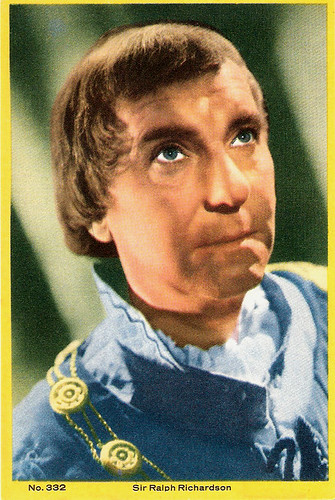
Mexican collectors card, no. 332.
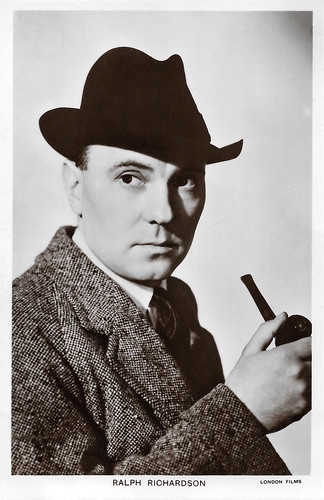
British postcard in the Picturegoer Series, London, no. 1216a. Photo: London Films. Ralph Richardson in Home at Seven (Ralph Richardson, 1952).
Ralph David Richardson was born in Cheltenham, England, in 1902. He was the third son and youngest child of Arthur Richardson, a master at the Ladies' College and his wife Lydia née Russell. When he was a baby, his mother left his father and took him with her to Gloucester, where he was brought up in the Roman Catholic faith of his mother (his father and brothers were Quakers). His father supported them with a small allowance.
Lydia Richardson wished Ralph to become a priest. He was an altar boy in Brighton, and was sent to the Xavierian College, but he ran away from it. After working as an office boy for an insurance company, and later studying art, Richardson opted for a theatrical career. Aided by a small legacy from his grandmother, he paid a local theatrical manager ten shillings a week to be taught about acting.
He began his acting career at age 18 in The Merchant of Venice (1921) and toured with Charles Doran's company for five seasons, gradually being promoted to larger parts. In September 1924, Richardson married the seventeen-year-old student actress Muriel Hewitt. Their marriage was childless but devoted.
In 1925 he joined Sir Barry Jackson's Birmingham Repertory Company, where Richardson absorbed the influence of older contemporaries like Gerald du Maurier, and Mrs. Patrick Campbell. Richardson made his London debut in July 1926 as the stranger in Oedipus at Colonus in a small theatre, followed by his West End debut as Arthur Varwell in Yellow Sands which ran for 610 performances and from then to 1929 played in supporting roles in London productions.
After touring in South Africa in 1929, he played two seasons at the Old Vic and two seasons at the Malvern summer theatre. He pursued the great character roles. His Old Vic roles included Caliban to the Prospero of John Gielgud, beginning a professional association and friendship that lasted for five decades. Richardson's other parts in the Old Vic seasons included Bottom in A Midsummer Night's Dream, Petruchio in The Taming of the Shrew, Henry V, Brutus in Julius Caesar, and Iago in Othello.
In 1933 he made his film debut with a small part in the first British horror film of the sound era, The Ghoul (T. Hayes Hunter, 1933) starring Boris Karloff. He had a bigger part in the drama The King of Paris (Jack Raymond, 1934) starring Cedric Hardwicke. He had the leading part in the mystery The Return of Bulldog Drummond (Walter Summers, 1934) with Ann Todd.
Richardson became an undisputed West End star as Clitterhouse in Barré Lyndon's comedy melodrama, The Amazing Dr. Clitterhouse which ran for 492 performances from August 1936, and most of all as Johnson in J. B. Priestley's Johnson Over Jordan directed by Basil Dean, with music by Benjamin Britten. Richardson was engaged to play the role of Mercutio, replacing Orson Welles, in the 1934 Broadway production of Romeo and Juliet.
Richardson's film appearances include the Sci-Fi film Things to Come (William Cameron Menzies, 1936) which H.G. Wells adapted for the screen from his own novel, The Citadel (King Vidor, 1938) starring Robert Donat, and the adventure film The Four Feathers (Zoltan Korda, 1939). Brian MacFarlane writes in the Encyclopaedia of British Cinema: “Never handsome, he was always going to be a limited leading man in films and his 1930’s films tend to the eccentric or the character lead”.
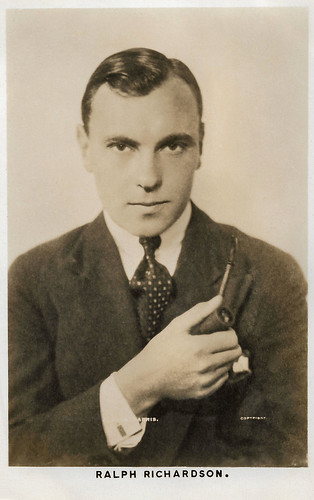
British postcard. Photo: Harris (?).
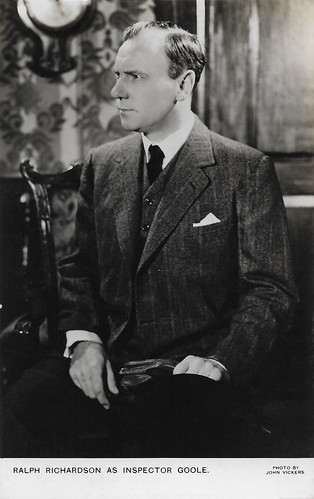
British postcard. Photo: John Vickers. Ralph Richardson in the stage play 'An Inspector Calls' (1946). An Inspector Calls is written by English dramatist J. B. Priestley, and was first performed in the Soviet Union in 1945. The play had its first British production in 1946 at the New Theatre in London with Ralph Richardson as Inspector Goole.
During World War II, Ralph Richardson served in the Royal Naval Volunteer Reserve, where he rose to the rank of Lieutenant-Commander. Richardson and Laurence Olivier were released from the armed forces in 1944 to run the Old Vic company as a triumvirate with the stage director John Burrell. The Old Vic theatre was out of use because of bomb damage, and the company moved to the New Theatre in St. Martin's Lane.
During this period, Richardson gave some of his most noted performances, including Falstaff and Peer Gynt. He also directed Alec Guinness as Richard II. In 1945 Richardson and Olivier led the company in a tour of Germany, where they were seen by many thousands of servicemen; they also appeared at the Comédie Française in Paris.
In 1942, his first wife Muriel Hewitt contracted sleeping sickness and died after a long illness. Two years later Richardson married the actress Meriel Forbes, a member of the theatrical Forbes-Robertson family. They had one son, Charles David (1945-1998).
Richardson starred in the thriller The Fallen Idol (Carol Reed, 1948) with Michèle Morgan. Brian MacFarlane in the Encyclopaedia of British Cinema: “perhaps his finest screen work, full of subtle, suppressed longing and pain”. A year later he appeared as Olivia de Havilland’s abusive father in The Heiress (William Wyler, 1949). This part resulted in his first nomination for an Academy Award as Best Supporting Actor.
In 1952 he co-starred with Ann Todd in the romantic war drama The Sound Barrier (David Lean, 1952). For this role he won the BAFTA Award for Best British Actor. He was nominated for a BAFTA on another three occasions (his last being for Greystoke in 1984). That year he also played an English minister in the heartwarming drama The Holly and the Ivy (George More O'Ferrall, 1952) with Celia Johnson.
In 1954 and 1955 Richardson played Dr. Watson in an American/BBC radio co-production of Sherlock Holmes stories, with John Gielgud as Holmes and Orson Welles as the villainous Professor Moriarty. Richardson turned down the role of Estragon in Peter Hall's premiere of the English-language version of Waiting for Godot and later reproached himself for missing the chance to be in ‘the greatest play of my generation’.
In the cinema he played Buckingham to Laurence Olivier's Richard in Richard III (Laurence Olivier, 1955). Richardson's Timon of Athens in his 1956 return to the Old Vic was well received, as was his Broadway appearance in The Waltz of the Toreadors for which he was nominated for a Tony Award in 1957. Also successful were the films Our Man in Havana (Carol Reed, 1959), starring Alec Guinness, and Exodus (Otto Preminger, 1960) starring Paul Newman.

British postcard by Real Photograph, no. 260.

British postcard by Show Parade Picture Service in The People series, no. P. 1100. Photo: J. Arthur Rank Organisation Ltd.
In the 1960s, Ralph Richardson appeared successfully as Sir Peter Teazle in John Gielgud's production of The School for Scandal, and the original production of Joe Orton's controversial farce What the Butler Saw in the West End at the Queen's Theatre in 1969 with Stanley Baxter.
Richardson played Lord Emsworth on BBC television in dramatisations of P. G. Wodehouse's Blandings Castle stories, with his wife Meriel Forbes playing his domineering sister Connie, and his friend Stanley Holloway as his butler Beach.
In 1963, Richardson won the Best Actor Award at the Cannes Film Festival for Long Day's Journey into Night (1962, Sidney Lumet). Author Eugene O'Neill gives in this film an autobiographical account of his explosive homelife, fused by a morphine-addicted mother (Katharine Hepburn), and a father (Richardson) who wallows in drink after realising he is no longer a famous actor.
Richardson also appeared in such film successes as Doctor Zhivago (David Lean, 1965), Oh! What a Lovely War (Richard Attenborough, 1969), and Battle of Britain (Guy Hamilton, 1969).
In the 1970s, he played in the West End and with the National Theatre under Peter Hall's direction. In the cinema he played in O Lucky Man! (Lindsay Anderson, 1973), the TV Mini-series Jesus of Nazareth (Franco Zeffirelli, 1977), and did a cameo appearance near the end of the Terry Gilliam film Time Bandits (1981).
Also that same year, he appeared as Ulrich of Craggenmoor, the ageing sorcerer who takes on an ancient dragon in the fantasy epic Dragonslayer (Matthew Robbins, 1981). Mike Cummings at AllMoviecalls Richardson ‘one of his country's most celebrated eccentrics’: “Well into old age, he continued to enthrall audiences with his extraordinary acting skills - and to irritate neighbors with his noisy motorbike outings, sometimes with a parrot on his shoulder. He collected paintings, antiquities, and white mice.”
However, Richardson continued his long stage association with John Gielgud, appearing together in two new works, David Storey's Home and Harold Pinter's No Man's Land. His last stage appearance was at the National in the lead role in Eduardo De Filippo's Inner Voices in June 1983.
In the cinema he played the sixth Earl of Greystoke in Greystoke: The Legend of Tarzan, Lord of the Apes (Hugh Hudson, 1984), for which he was again nominated for an Academy Award. His last film appearance was in Give My Regards to Broad Street (Peter Webb, 1984), starring Paul McCartney.
In 1983, Ralph Richardson died of a stroke, aged 80. Richardson was knighted in 1947, the first of his generation of actors to receive the accolade. He received Best Supporting Actor Oscar nominations for The Heiress and Greystoke, as well as New York Film Critics Circle and National Board of Review Awards for Best Actor for The Sound Barrier and another NYFCC Award for Best Supporting Actor for Greystoke. His Oscar nomination, BAFTA nomination and NYFCC Award for Greystoke were all posthumous.
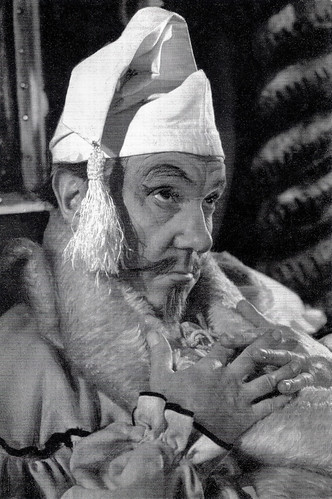
British postcard in the Shakespeare Memorial Theatre series, no. 19. Photo: Angus McBean. Caption: Ralph Richardson as Volpone, Stratford-upon-Avon, 1952.
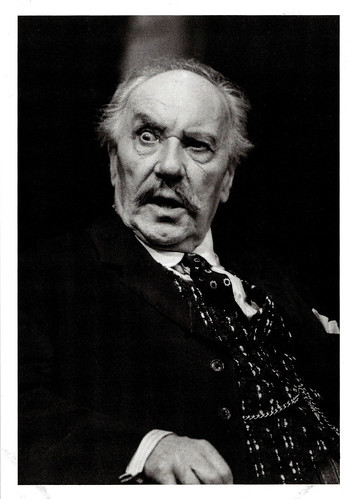
British postcard by NT (National Theatre). Photo: Alastair Muir. Ralph Richardson in the stage production of Inner Voices (1983) by Eduardo De Filippo at the Lyttelton Theatre.
Trailer The Fallen Idol (1948). Source: Trailer Chan (YouTube).
Theatrical trailer Richard III (1955). Source: Criterion Collection (YouTube).
Sources: Brian McFarlane (Encyclopaedia of British Cinema), Mike Cummings (AllMovie), Britannica.com, Wikipedia and IMDb.

Mexican collectors card, no. 332.

British postcard in the Picturegoer Series, London, no. 1216a. Photo: London Films. Ralph Richardson in Home at Seven (Ralph Richardson, 1952).
The First British Horror Film
Ralph David Richardson was born in Cheltenham, England, in 1902. He was the third son and youngest child of Arthur Richardson, a master at the Ladies' College and his wife Lydia née Russell. When he was a baby, his mother left his father and took him with her to Gloucester, where he was brought up in the Roman Catholic faith of his mother (his father and brothers were Quakers). His father supported them with a small allowance.
Lydia Richardson wished Ralph to become a priest. He was an altar boy in Brighton, and was sent to the Xavierian College, but he ran away from it. After working as an office boy for an insurance company, and later studying art, Richardson opted for a theatrical career. Aided by a small legacy from his grandmother, he paid a local theatrical manager ten shillings a week to be taught about acting.
He began his acting career at age 18 in The Merchant of Venice (1921) and toured with Charles Doran's company for five seasons, gradually being promoted to larger parts. In September 1924, Richardson married the seventeen-year-old student actress Muriel Hewitt. Their marriage was childless but devoted.
In 1925 he joined Sir Barry Jackson's Birmingham Repertory Company, where Richardson absorbed the influence of older contemporaries like Gerald du Maurier, and Mrs. Patrick Campbell. Richardson made his London debut in July 1926 as the stranger in Oedipus at Colonus in a small theatre, followed by his West End debut as Arthur Varwell in Yellow Sands which ran for 610 performances and from then to 1929 played in supporting roles in London productions.
After touring in South Africa in 1929, he played two seasons at the Old Vic and two seasons at the Malvern summer theatre. He pursued the great character roles. His Old Vic roles included Caliban to the Prospero of John Gielgud, beginning a professional association and friendship that lasted for five decades. Richardson's other parts in the Old Vic seasons included Bottom in A Midsummer Night's Dream, Petruchio in The Taming of the Shrew, Henry V, Brutus in Julius Caesar, and Iago in Othello.
In 1933 he made his film debut with a small part in the first British horror film of the sound era, The Ghoul (T. Hayes Hunter, 1933) starring Boris Karloff. He had a bigger part in the drama The King of Paris (Jack Raymond, 1934) starring Cedric Hardwicke. He had the leading part in the mystery The Return of Bulldog Drummond (Walter Summers, 1934) with Ann Todd.
Richardson became an undisputed West End star as Clitterhouse in Barré Lyndon's comedy melodrama, The Amazing Dr. Clitterhouse which ran for 492 performances from August 1936, and most of all as Johnson in J. B. Priestley's Johnson Over Jordan directed by Basil Dean, with music by Benjamin Britten. Richardson was engaged to play the role of Mercutio, replacing Orson Welles, in the 1934 Broadway production of Romeo and Juliet.
Richardson's film appearances include the Sci-Fi film Things to Come (William Cameron Menzies, 1936) which H.G. Wells adapted for the screen from his own novel, The Citadel (King Vidor, 1938) starring Robert Donat, and the adventure film The Four Feathers (Zoltan Korda, 1939). Brian MacFarlane writes in the Encyclopaedia of British Cinema: “Never handsome, he was always going to be a limited leading man in films and his 1930’s films tend to the eccentric or the character lead”.

British postcard. Photo: Harris (?).

British postcard. Photo: John Vickers. Ralph Richardson in the stage play 'An Inspector Calls' (1946). An Inspector Calls is written by English dramatist J. B. Priestley, and was first performed in the Soviet Union in 1945. The play had its first British production in 1946 at the New Theatre in London with Ralph Richardson as Inspector Goole.
Missing the Greatest Play Of My Generation
During World War II, Ralph Richardson served in the Royal Naval Volunteer Reserve, where he rose to the rank of Lieutenant-Commander. Richardson and Laurence Olivier were released from the armed forces in 1944 to run the Old Vic company as a triumvirate with the stage director John Burrell. The Old Vic theatre was out of use because of bomb damage, and the company moved to the New Theatre in St. Martin's Lane.
During this period, Richardson gave some of his most noted performances, including Falstaff and Peer Gynt. He also directed Alec Guinness as Richard II. In 1945 Richardson and Olivier led the company in a tour of Germany, where they were seen by many thousands of servicemen; they also appeared at the Comédie Française in Paris.
In 1942, his first wife Muriel Hewitt contracted sleeping sickness and died after a long illness. Two years later Richardson married the actress Meriel Forbes, a member of the theatrical Forbes-Robertson family. They had one son, Charles David (1945-1998).
Richardson starred in the thriller The Fallen Idol (Carol Reed, 1948) with Michèle Morgan. Brian MacFarlane in the Encyclopaedia of British Cinema: “perhaps his finest screen work, full of subtle, suppressed longing and pain”. A year later he appeared as Olivia de Havilland’s abusive father in The Heiress (William Wyler, 1949). This part resulted in his first nomination for an Academy Award as Best Supporting Actor.
In 1952 he co-starred with Ann Todd in the romantic war drama The Sound Barrier (David Lean, 1952). For this role he won the BAFTA Award for Best British Actor. He was nominated for a BAFTA on another three occasions (his last being for Greystoke in 1984). That year he also played an English minister in the heartwarming drama The Holly and the Ivy (George More O'Ferrall, 1952) with Celia Johnson.
In 1954 and 1955 Richardson played Dr. Watson in an American/BBC radio co-production of Sherlock Holmes stories, with John Gielgud as Holmes and Orson Welles as the villainous Professor Moriarty. Richardson turned down the role of Estragon in Peter Hall's premiere of the English-language version of Waiting for Godot and later reproached himself for missing the chance to be in ‘the greatest play of my generation’.
In the cinema he played Buckingham to Laurence Olivier's Richard in Richard III (Laurence Olivier, 1955). Richardson's Timon of Athens in his 1956 return to the Old Vic was well received, as was his Broadway appearance in The Waltz of the Toreadors for which he was nominated for a Tony Award in 1957. Also successful were the films Our Man in Havana (Carol Reed, 1959), starring Alec Guinness, and Exodus (Otto Preminger, 1960) starring Paul Newman.

British postcard by Real Photograph, no. 260.

British postcard by Show Parade Picture Service in The People series, no. P. 1100. Photo: J. Arthur Rank Organisation Ltd.
Ulrich of Craggenmoor
In the 1960s, Ralph Richardson appeared successfully as Sir Peter Teazle in John Gielgud's production of The School for Scandal, and the original production of Joe Orton's controversial farce What the Butler Saw in the West End at the Queen's Theatre in 1969 with Stanley Baxter.
Richardson played Lord Emsworth on BBC television in dramatisations of P. G. Wodehouse's Blandings Castle stories, with his wife Meriel Forbes playing his domineering sister Connie, and his friend Stanley Holloway as his butler Beach.
In 1963, Richardson won the Best Actor Award at the Cannes Film Festival for Long Day's Journey into Night (1962, Sidney Lumet). Author Eugene O'Neill gives in this film an autobiographical account of his explosive homelife, fused by a morphine-addicted mother (Katharine Hepburn), and a father (Richardson) who wallows in drink after realising he is no longer a famous actor.
Richardson also appeared in such film successes as Doctor Zhivago (David Lean, 1965), Oh! What a Lovely War (Richard Attenborough, 1969), and Battle of Britain (Guy Hamilton, 1969).
In the 1970s, he played in the West End and with the National Theatre under Peter Hall's direction. In the cinema he played in O Lucky Man! (Lindsay Anderson, 1973), the TV Mini-series Jesus of Nazareth (Franco Zeffirelli, 1977), and did a cameo appearance near the end of the Terry Gilliam film Time Bandits (1981).
Also that same year, he appeared as Ulrich of Craggenmoor, the ageing sorcerer who takes on an ancient dragon in the fantasy epic Dragonslayer (Matthew Robbins, 1981). Mike Cummings at AllMoviecalls Richardson ‘one of his country's most celebrated eccentrics’: “Well into old age, he continued to enthrall audiences with his extraordinary acting skills - and to irritate neighbors with his noisy motorbike outings, sometimes with a parrot on his shoulder. He collected paintings, antiquities, and white mice.”
However, Richardson continued his long stage association with John Gielgud, appearing together in two new works, David Storey's Home and Harold Pinter's No Man's Land. His last stage appearance was at the National in the lead role in Eduardo De Filippo's Inner Voices in June 1983.
In the cinema he played the sixth Earl of Greystoke in Greystoke: The Legend of Tarzan, Lord of the Apes (Hugh Hudson, 1984), for which he was again nominated for an Academy Award. His last film appearance was in Give My Regards to Broad Street (Peter Webb, 1984), starring Paul McCartney.
In 1983, Ralph Richardson died of a stroke, aged 80. Richardson was knighted in 1947, the first of his generation of actors to receive the accolade. He received Best Supporting Actor Oscar nominations for The Heiress and Greystoke, as well as New York Film Critics Circle and National Board of Review Awards for Best Actor for The Sound Barrier and another NYFCC Award for Best Supporting Actor for Greystoke. His Oscar nomination, BAFTA nomination and NYFCC Award for Greystoke were all posthumous.

British postcard in the Shakespeare Memorial Theatre series, no. 19. Photo: Angus McBean. Caption: Ralph Richardson as Volpone, Stratford-upon-Avon, 1952.

British postcard by NT (National Theatre). Photo: Alastair Muir. Ralph Richardson in the stage production of Inner Voices (1983) by Eduardo De Filippo at the Lyttelton Theatre.
Trailer The Fallen Idol (1948). Source: Trailer Chan (YouTube).
Theatrical trailer Richard III (1955). Source: Criterion Collection (YouTube).
Sources: Brian McFarlane (Encyclopaedia of British Cinema), Mike Cummings (AllMovie), Britannica.com, Wikipedia and IMDb.
1 comment:
Post a Comment